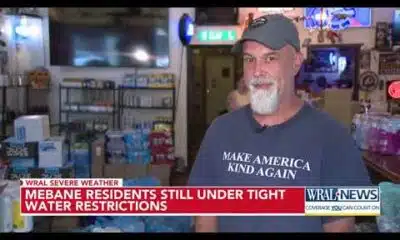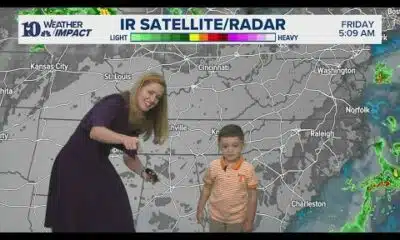News from the South - Arkansas News Feed
The federal Voting Rights Act was gutted. States now want their own versions.
by Matt Vasilogambros, Stateline, Arkansas Advocate
March 23, 2025
Seeing federal courts slash away at the Voting Rights Act, some states are seeking to resurrect fallen protections for non-white voters with their own versions of the landmark law passed during the height of the Civil Rights Movement.
Democratic lawmakers in Alabama, Arizona, Colorado, Florida, Illinois, Maryland and New Jersey are pushing such legislation this session, attempting to join seven other states with similar laws enacted in recent years.
But carrying these bills to law will be a tall task for lawmakers, even in blue states. Michigan’s Voting Rights Act legislation died in the state House after passing the Senate last year. And active bills in Democratic-led states are not guaranteed passage this year because of legal concerns.
New York’s and Washington state’s voting rights acts have survived legal challenges over the past two years.
The federal Voting Rights Act of 1965 was a landmark civil rights law during one of most pivotal times in American history. Black Americans and their allies marched, lobbied and died for the vote, facing state-sponsored violence as they pushed the country to correct historical wrongs, reckon with its Jim Crow reign of terror and guarantee their right to the ballot box.
Since then, the federal Voting Rights Act has been used by courts and the U.S. Department of Justice to protect nonwhite voters from policies and redistricting schemes that made it harder for them to vote or diluted their political power.
But federal courts — including the U.S. Supreme Court — have whittled away those protections in recent decades, claiming the discrimination that led to the law no longer exists. In 2013, the high court cleaved off a major portion of the law’s enforcement mechanism that kept jurisdictions that had historically discriminated against Black people from enacting measures that could once again keep them from the polls.
Some state lawmakers have seen enough.
“You can’t rely on the federal government to do the right thing,” said Democratic state Sen. Charles Sydnor III, who is sponsoring the Maryland Voting Rights Act.
Maryland’s measure, which passed the state Senate this month and will have a House committee hearing next week, seeks to ensure that racial minority communities are fairly represented in county and municipal districts. Sydnor said he was inspired to write the legislation after being disturbed by what he saw as a dilution of Black voting power in the redistricting process for the Baltimore County Council over the years.
“We need to set aside the gamesmanship,” he added in an interview with Stateline. “Everybody should have an opportunity to select folks who represent them.”
The measure would allow the state attorney general or voters to sue localities that organize local voting districts in a way that dilutes political representation from voters of any racial, color or language minority. If a court agrees with the plaintiffs, it could force the locality to redraw district lines or change voting procedures.
This is the fourth time that Sydnor has attempted to pass this legislation, though its substance has changed over the years. Previous versions, which never made it out of committee, had more robust language mirroring other states’ enacted voting rights acts. That included provisions borrowed from Connecticut and New York that would have required local jurisdictions to seek permission, or preclearance, from the state attorney general or the courts before changing election procedures.
The current bill passed the Maryland Senate with no Republican support this month. Leading floor debate, Republican state Sen. Steve Hershey said he found the language of the bill confusing and worried it might hurt rural constituents. He did not respond to a Stateline interview request.
While provisions vary by state, state-level voting rights acts seek to bring back many of the protections that had once been a part of the federal statute.
“When we see right now that the federal government and the federal courts are not doing their jobs to protect us, it’s critical that states step up and take the initiative to enshrine the protections of the Voting Rights Act into their state laws,” said Sylvia Albert, democracy and representation policy counsel at Common Cause, a pro-democracy organization.
Dismantled in the courts
Sixty years after President Lyndon B. Johnson signed it into law, the Voting Rights Act is under attack. Crafted in a time of state-sponsored racist violence, poll taxes and literacy tests, the landmark legislation has been the cornerstone of guaranteeing equal access to the ballot box for racial minority groups.
But for more than a decade, the conservative-led U.S. Supreme Court has handed down decisions that have substantially weakened it.
In 2013, the high court issued a massive blow to the law in Shelby County v. Holder.
The ruling dismantled Section 5 of the law, which prohibited most former Confederate states from enacting new election laws or local ordinances without seeking federal permission first. The restrictions also applied to Alaska, Arizona and more than 50 other local jurisdictions in California, Florida, Michigan, New York, North Carolina and South Dakota with a history of racially discriminatory voting policies.
The measures subject to preclearance ranged from redistricting processes to voter identification laws to changes in the location of a polling place.
“Our country has changed,” Chief Justice John Roberts wrote in the majority opinion. He added that the Voting Rights Act should reflect “current conditions.”
In 2021, in a case over an Arizona law that limited nonprofit activist groups’ ability to collect and turn in absentee ballots on voters’ behalf, the conservative majority set a high bar for voting rights groups to claim election laws were crafted to discriminate against racial minorities.
And next week, the Supreme Court will hear oral arguments in a dispute over Louisiana’s congressional map that could further weaken the Voting Rights Act.
It’s critical that states step up and take the initiative to enshrine the protections of the Voting Rights Act into their state laws.
– Sylvia Albert, democracy and representation counsel at Common Cause
While Louisiana’s population is a third Black, the legislature in 2022 drew the state’s congressional map so that only one of its six districts was majority Black. After voters brought a lawsuit, a lower court in 2023 forced the state to redraw the map to create another majority-Black district. However, a group of white residents is now arguing the new map violates their rights.
The outcome of the case, Louisiana v. Callais, could determine the future legality of Section 2 of the Voting Rights Act, which was written to protect voters from racially discriminatory voting laws.
“Voter suppression in Louisiana is like putting a boot on the neck of Black voters,” said Alanah Odoms, executive director at American Civil Liberties Union of Louisiana. “Voting rights activists are simply asking for the boot to be removed.”
Section 2 was already under threat by federal courts after the 8th U.S. Circuit Court of Appeals in 2023 upheld a ruling that only the federal government, not affected voters or civil rights groups, could sue under that section of the Voting Rights Act.
That ruling applies to Arkansas, Iowa, Minnesota, Missouri, Nebraska, North Dakota and South Dakota — the states under that court’s jurisdiction. The case was not appealed to the Supreme Court.
A useful tool for states
Earlier this month, Odoms walked with tens of thousands of others across the Edmund Pettus Bridge in Selma, Alabama, to mark the 60th anniversary of Bloody Sunday, when state troopers and local law enforcement violently cracked down on civil rights activists peacefully marching for voting rights. The event helped galvanize national support for federal voting rights legislation.
Congressional Democrats have invoked civil rights hero and Selma marcher John Lewis’ name in federal legislation several times in recent years, attempting to restore sections of the Voting Rights Act that have been gutted. Lewis, who represented Atlanta in Congress for 33 years, died in 2020.
But the federal legislation has no chance of becoming law with the current Republican majorities in Congress and with President Donald Trump in the Oval Office.
The Trump administration also has signaled that it will not enforce voting rights nor pursue other civil rights cases. Seeing the tides turn, some Republican state officials have asked the U.S. Justice Department to drop cases that the Biden administration brought under the Voting Rights Act, including Georgia Secretary of State Brad Raffensperger.
In a February letter, Raffensperger urged U.S. Attorney General Pam Bondi to drop the federal government’s lawsuit against his state and issue a statement of support for the “common-sense approach” to elections, writing that the Biden administration wrongly argued the policies were racially discriminatory. Biden called the law “Jim Crow in the 21st Century.”
Seeing this, some states have found their own voting rights acts a useful tool to shore up protections for voters of color, said Nicholas Stephanopoulos, a professor at Harvard Law School who has studied this issue.
But, he added, there are limitations to these state laws, not least of which is that they are restricted to states that were, for the most part, not covered by the preclearance requirements under the original federal Voting Rights Act.
“It’s a huge problem that these bills can’t be passed politically in the South,” Stephanopoulos said. “The whole point of the original federal law was to bring minority voters into the political community in the South above all.”
However, even for states that are seen by democracy advocates as having the strongest pro-voter policies, it’s important to pass these measures, said Colorado state Sen. Julie Gonzales, a Democrat who is sponsoring a broad Voting Rights Act in her state. Colorado has the “gold standard” of elections, but more can be done to close the racial disparities of voter participation, she said, noting her Chicana background.
Gonzales’ bill, which is sitting in committee, would prevent municipalities from creating districts that dilute the political representation of racial- and language-minority voters. It also would create clearer pathways for voters to seek resolution to voter suppression in courts and expand language access for ballots.
She added that she has sensed excitement among her Democratic colleagues to get the bill signed into law this year.
“We’re witnessing the erosion of bedrock protections related to the civil rights of voters to be able to cast a ballot free from discrimination,” Gonzales told Stateline. “It’s time for us to act.”
Stateline reporter Matt Vasilogambros can be reached at mvasilogambros@stateline.org.
Stateline is part of States Newsroom, a nonprofit news network supported by grants and a coalition of donors as a 501c(3) public charity. Stateline maintains editorial independence. Contact Editor Scott S. Greenberger for questions: info@stateline.org.
Arkansas Advocate is part of States Newsroom, a nonprofit news network supported by grants and a coalition of donors as a 501c(3) public charity. Arkansas Advocate maintains editorial independence. Contact Editor Sonny Albarado for questions: info@arkansasadvocate.com.
The post The federal Voting Rights Act was gutted. States now want their own versions. appeared first on arkansasadvocate.com
News from the South - Arkansas News Feed
Grant Hardin used black marker & soup can to create disguise that allowed his escape
SUMMARY: Grant Hardin, a convicted murderer, rapist, and former police officer, escaped a medium-security prison in Arkansas using a disguise he crafted from kitchen materials. He dyed a shirt with a black marker, fashioned a makeshift badge from a soup can, Bible cover, and button, and used an apron as a bulletproof vest. The escape, lasting 12 days in the woods, revealed serious staff failures: a kitchen worker let Hardin unsupervised for over an hour, and a guard left a gate open unattended. Two prison employees were fired, but lawmakers remain unsatisfied. Hardin’s threat level was reportedly too low for his offenses, prompting ongoing investigations.
Grant Hardin used black marker & soup can to create disguise that allowed his escape Subscribe to 40/29 on YouTube now for …
News from the South - Arkansas News Feed
Re-live the Beatles epic 1964 tour stop in Cincinnati
SUMMARY: The Beatles’ 1964 Cincinnati tour stop featured lively interactions and candid remarks. The band discussed their trip, politics—expressing skepticism about Goldwater—and addressed rumors about being banned in the U.S., dismissing them as baseless. They talked about novelty merchandise like mugs but denied inventing such items. The Beatles shared impressions of American movie stars like Burt Lancaster and Gordon, describing encounters as mixed but mostly positive. Their unique hairstyles were playfully explained as natural. The clip captures the group’s playful, down-to-earth nature amid their historic U.S. visit, blending humor, music, and cultural observations.
The Beatles came to Cincinnati to play a show in August 1964 as part of a 25-city North American tour. In this rare footage, see John Lennon, Paul McCartney, George Harrison and Ringo Starr as they land at the airport to the delight of throngs of die-hard fans. The Fab Four also chatted with local media about whether they should be banned, what they knew about the upcoming presidential election and how they felt about American movie stars.
Subscribe to WLWT on YouTube now for more: http://bit.ly/1ipUX3c
Get more Cincinnati news: http://www.wlwt.com
Like us: http://www.facebook.com/wlwt5
Follow us: http://twitter.com/WLWT
Instagram: https://www.instagram.com/wlwt5/
News from the South - Arkansas News Feed
US Education Department to revive student loan interest for borrowers in SAVE program
by Shauneen Miranda, Arkansas Advocate
July 9, 2025
WASHINGTON — Interest accrual on the debt of nearly 7.7 million student loan borrowers enrolled in the Saving on a Valuable Education plan will resume Aug. 1, the U.S. Education Department said Wednesday.
The Biden-era income-driven repayment plan better known as SAVE saw legal challenges from several GOP-led states beginning in 2024, creating uncertainty for borrowers who were placed in an interest-free forbearance amid that legal limbo.
The SAVE plan, created in 2023, aimed to provide lower monthly loan payments for borrowers and forgive remaining debt after a certain period of time.
In February, a federal appeals court upheld a lower court injunction that blocked the SAVE plan from going into effect. The department said Wednesday that it’s instructing its federal student loan servicers to start charging interest Aug. 1 to comply with court orders.
When the SAVE plan forbearance ends, “borrowers will be responsible for making monthly payments that include any accrued interest as well as their principal amounts,” the department said in a written announcement.
“For years, the Biden Administration used so-called ‘loan forgiveness’ promises to win votes, but federal courts repeatedly ruled that those actions were unlawful,” Education Secretary Linda McMahon said in a statement alongside the announcement.
“Congress designed these programs to ensure that borrowers repay their loans, yet the Biden Administration tried to illegally force taxpayers to foot the bill instead,” she added.
McMahon said her department is urging borrowers under the SAVE plan to “quickly transition to a legally compliant repayment plan.”
“Borrowers in SAVE cannot access important loan benefits and cannot make progress toward loan discharge programs authorized by Congress,” she said.
‘Unnecessary interest charges’
Mike Pierce, executive director of the Student Borrower Protection Center, blasted the department’s decision in a statement Wednesday.
“Instead of fixing the broken student loan system, Secretary McMahon is choosing to drown millions of people in unnecessary interest charges and blaming unrelated court cases for her own mismanagement,” he said.
“Every day, we hear from borrowers waiting on hold with their servicer for hours, begging the government to let them out of this forbearance, and help them get back on track — instead, McMahon is choosing to jack up the cost of their student debt without giving them a way out.”
The agency has taken heat for its sweeping actions in the months since President Donald Trump took office as he and his administration look to dismantle the department.
The department is also mired in a legal challenge over some of its most significant efforts so far, including laying off more than 1,300 employees earlier this year as part of a reduction in force effort, an executive order calling on McMahon to facilitate the closure of her own agency and Trump’s proposal to transfer some services to other federal agencies. These actions have been temporarily halted in court.
Meanwhile, President Donald Trump signed a massive tax and spending cut bill into law last week, part of which forces any borrower under the SAVE plan to opt in to a different repayment plan by July 1, 2028, or be automatically placed in a new, income-based repayment plan.
Arkansas Advocate is part of States Newsroom, a nonprofit news network supported by grants and a coalition of donors as a 501c(3) public charity. Arkansas Advocate maintains editorial independence. Contact Editor Sonny Albarado for questions: info@arkansasadvocate.com.
The post US Education Department to revive student loan interest for borrowers in SAVE program appeared first on arkansasadvocate.com
Note: The following A.I. based commentary is not part of the original article, reproduced above, but is offered in the hopes that it will promote greater media literacy and critical thinking, by making any potential bias more visible to the reader –Staff Editor.
Political Bias Rating: Center-Right
This article presents the developments around the federal student loan SAVE plan primarily through a critical lens toward the Biden administration’s policies, emphasizing legal challenges and statements from Education Secretary Linda McMahon, a Trump appointee, who frames the administration’s actions as unlawful and fiscally irresponsible. It includes critical commentary from conservative officials and frames the Biden-era policies as politically motivated. Although it also quotes critics of the Education Department’s decision, the overall tone and source choices suggest a center-right leaning, reflecting skepticism of progressive loan forgiveness policies while focusing on legal and fiscal accountability.
-
News from the South - Georgia News Feed7 days ago
'Big Beautiful Bill' already felt at Georgia state parks | FOX 5 News
-
The Center Square7 days ago
Alcohol limits at odds in upcoming dietary guidelines | National
-
The Center Square5 days ago
Here are the violent criminals Judge Murphy tried to block from deportation | Massachusetts
-
News from the South - Kentucky News Feed5 days ago
Woman arrested in Morgantown McDonald’s parking lot
-
News from the South - Texas News Feed6 days ago
Hill Country flooding: Here’s how to give and receive help
-
News from the South - North Carolina News Feed6 days ago
Raleigh caps Independence Day with fireworks show outside Lenovo Center
-
News from the South - Missouri News Feed7 days ago
Shannon County Sheriff alleges ‘orchestrated campaign of harassment and smear tactics,’ threats to life
-
Our Mississippi Home7 days ago
The Other Passionflower | Our Mississippi Home










































